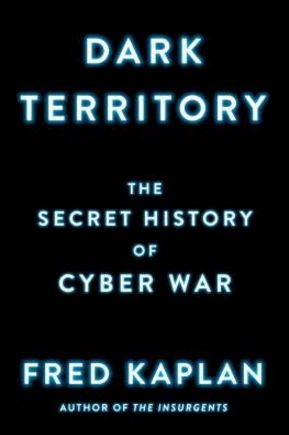
“Dark Territory: The Secret History of Cyber War”
By Fred Kaplan
Simon & Schuster (352 pages, $28)
You’ve heard the complaining, from the White House on down, about the cyberattacks on our country. Well, yes, you guessed it: We started it.
That’s one of the central thrusts of Fred Kaplan’s “Dark Territory: The Secret History of Cyber War.” Because it pioneered computing, the U.S. intelligence agencies enjoyed decades of dominance over rivals, and even learned how to remotely wreak havoc on, say, the Iranian nuclear program. But because nearly everything in our country is networked, we’re uniquely vulnerable now that the rest of the world has caught up.
“If America, or U.S. Cyber Command, wanted to wage cyber war,” Kaplan writes, “it would do so from inside a glass house.”
You heard echoes of breaking glass when federal prosecutors in Pittsburgh indicted five members of People’s Liberation Army Unit 61398 for stealing secrets from Alcoa, U.S. Steel and Westinghouse Electric. Also when North Korea, presumably, hacked and humiliated Sony. And did you know that Iran remotely ruined 20,000 computers owned by Las Vegas Sands Corp.?
The line between old-school espionage and cybersabotage blurred gradually over the past quarter century, Kaplan tells us, starting with 1991’s Operation Desert Storm, in which American intelligence hacked into Iraq’s air defense system.
Six years later, the Pentagon’s J-39 unit was able to remotely switch off Serbia’s government-controlled TV stations at key moments, hack Slobodan Milosevic’s radar systems and relentlessly prank call his top aides. (TNS)








![[Graphic News] More Koreans say they plan long-distance trips this year](http://res.heraldm.com/phpwas/restmb_idxmake.php?idx=644&simg=/content/image/2024/04/17/20240417050828_0.gif&u=)
![[KH Explains] Hyundai's full hybrid edge to pay off amid slow transition to pure EVs](http://res.heraldm.com/phpwas/restmb_idxmake.php?idx=644&simg=/content/image/2024/04/18/20240418050645_0.jpg&u=20240419100350)





![[From the Scene] Monks, Buddhists hail return of remains of Buddhas](http://res.heraldm.com/phpwas/restmb_idxmake.php?idx=652&simg=/content/image/2024/04/19/20240419050617_0.jpg&u=20240419175937)

![[KH Explains] Hyundai's full hybrid edge to pay off amid slow transition to pure EVs](http://res.heraldm.com/phpwas/restmb_idxmake.php?idx=652&simg=/content/image/2024/04/18/20240418050645_0.jpg&u=20240419100350)

![[Today’s K-pop] Illit drops debut single remix](http://res.heraldm.com/phpwas/restmb_idxmake.php?idx=642&simg=/content/image/2024/04/19/20240419050612_0.jpg&u=)